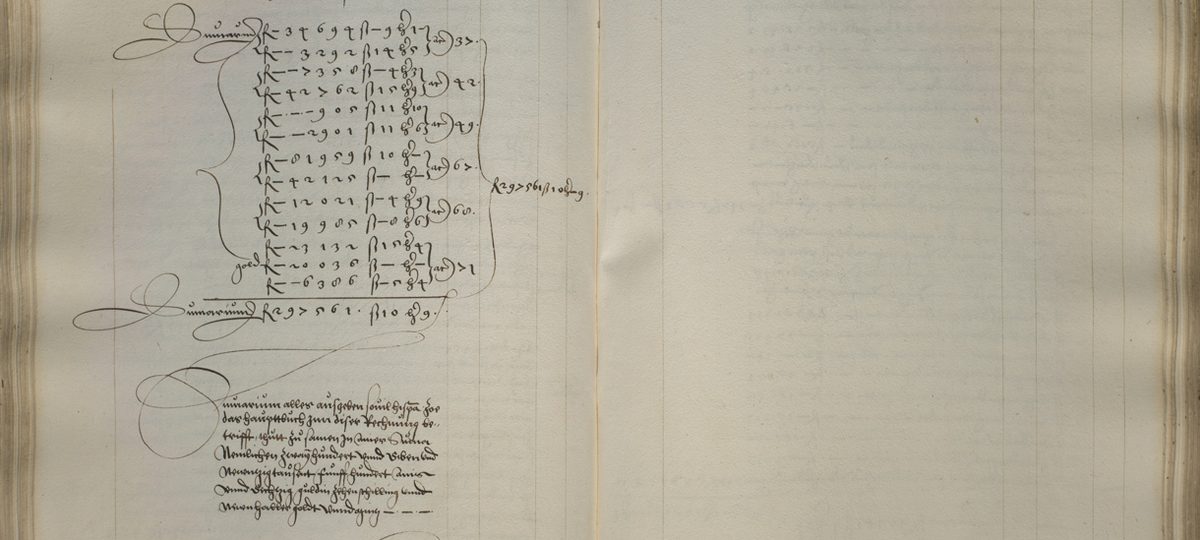Master weaver Hans Fugger's immigration to the Free Imperial City of Augsburg in 1367 marked the beginning of the Fugger firm's history. In just three generations, the firm rose to be one of the leading mercantile operations in Europe. Hans Fugger came to Augsburg with seed capital. Shrewd business and prudent marriages allowed him to increase his influence and his wealth. With Hans, the Fugger talent for commerce was already at work. He did not personally sit at the loom. He provided cotton and flax for the weavers on credit, securing the finished fustian textiles for himself, which he then sold on at a profit.
Jakob Fugger the Elder and his sons
After Hans's death, the business is led successfully by his widow and his sons Andreas and Jakob, known as »the Elder«. Jakob the Elder founds the lineage of Fugger von der Lilie. In 1466, Jakob Fugger the Elder is already the seventh-richest taxpayer in Augsburg. After his death in 1469, his widow Barbara and his sons Ulrich, Georg and Jakob bring the firm further successes. Jakob is given the sobriquet »the Rich« and to this day is known as the epitome of late medieval merchants with legendary riches and wide-reaching political influence.
Financiers for popes and emperors
Between 1472 and 1486, the family's wealth is doubled. The Fugger firm owns trading bases, so-called "factoring companies" in Venice and Nuremberg, handles its first financing operations for the Roman Curia and already has business connections with the House of Habsburg. In 1473, Ulrich Fugger supported Emperor Frederick in brokering a marriage for his son Maximilian by providing textiles. This marked the beginning of a successful relationship between the Fuggers and the Habsburgs. Jakob Fugger the Rich had been in Venice since he was 14 years old for to be educated as a merchant. Around 1486, he returned to Augsburg, where he soon proved his commercial genius. Through transactions in precious metals, goods and financing, he became the leading merchant of his day. Jakob Fugger's centres of business were in Tyrol, Carinthia and Upper Hungary (modern-day Slovakia). By providing credit to the manorial lords, he was able to have almost monopolistic control of the copper and silver deposits in the region. The loans he provided for the imperial election of Karl V brought him leasing rights for quicksilver mines in Spain, which were a main source of income for the firm for many decades. Parallel to his commercial activities, Jakob the Rich invested in land and manorial properties. The firm was a bank for popes, emperors and kings, was granted the right to mint Roman coins, and traded across continents in goods ranging from copper to newspapers.

![[Translate to English:] Ausgaben für St. Anna und die Fuggerei](https://media.fugger.de/fileadmin/Daten/kategorie-01-geschichte/art-firmengeschichte/geschichte-art-firmengeschichte-gal-001.jpg?width=792)
![[Translate to English:] Ausgaben für St. Anna und die Fuggerei](https://media.fugger.de/fileadmin/Daten/kategorie-01-geschichte/art-firmengeschichte/geschichte-art-firmengeschichte-gal-001.jpg?width=900)
![[Translate to English:] Bildnis Anton Fuggers von Hans Maler von Schwaz](https://media.fugger.de/fileadmin/Daten/kategorie-01-geschichte/art-firmengeschichte/geschichte-art-firmengeschichte-gal-002.jpg?width=900)
![[Translate to English:] Jakob Fugger der Reiche, porträtiert von Albrecht Dürer](https://media.fugger.de/fileadmin/Daten/kategorie-01-geschichte/art-firmengeschichte/geschichte-art-firmengeschichte-gal-003.jpg?width=900)
![[Translate to English:] Augsburger Rechnung 1539](https://media.fugger.de/fileadmin/Daten/kategorie-01-geschichte/art-firmengeschichte/geschichte-art-firmengeschichte-gal-004.jpg?width=900)